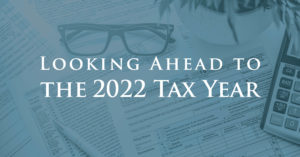
Certain proactive approaches to your 2022 taxes may impact your 2021 tax strategies. Therefore, even before you complete your 2021 taxes, it is essential to look toward the 2022 tax year.
It is generally assumed that by the time 2022 taxes are filed, the U.S. economy will no longer be affected primarily by the ups and downs of the Covid-19 pandemic. As a result, planning for the 2022 tax year will serve as—at least, to a significant degree—a return to a “normal” tax preparation strategy.
With that said, the lingering effects of the Covid-era tax policy will affect 2022 tax burdens and benefits to some extent. Accordingly, it remains important to pay close attention to nuanced shifts in the tax code that may affect your approach to personal or business-related tax strategy for the coming year.
2022 Tax Year – The Basics
The standard deduction for 2021 increased to $12,550 for single filers and $25,100 for married couples filing jointly. In 2022, that standard deduction will rise to $12,950 for single filers and $25,900 for married couples filing jointly. Similarly, in both 2021 and 2022, tax bracket (not rate) adjustments are being made to account for inflation.
Tax bracket changes will also affect Capital Gains burdens on 2022 returns. Conversely, the personal exemption amount will remain at zero in 2022, as the Tax Cuts and Jobs Act suspended this exemption through the 2025 tax year.
If you take the time to research your 2022 tax bracket now, you can proactively assess whether it makes sense to adjust your 2021 tax strategies to account for the adjustment. For example, suppose you are getting married, having a baby, or starting a business in 2022. In that case, you may want to adjust your withholding, pay quarterly, or otherwise account for a shift in your tax liability.
Note that the congressional Democrats still hope to pass the Build Back Better Act, which would impose new income tax surcharges on the wealthy. This bill would also increase the cap for state and local deductions. Keeping abreast of tax news developments will help inform your 2022 strategic approach.
Notable Credit and Deduction Changes
The $300 single filer/$600 joint filer charitable deduction available to 2021 filers who do not itemize has not extended for the 2022 tax year.
Unless the Build Back Better Act passes, the Child Tax Credit will revert. This means that filers with dependent children will only be able to claim $2,000 per qualifying child—subject to income phaseouts at $200,000 for single filers and $400,000 for joint filers.
Estate and Gift Tax Exemptions
For the 2022 tax year, the IRS is raising the estate and gift tax exemption limit from $11.7 million (2021) to $12.06 million per individual or $24.12 million per married couple filing jointly. The annual gift tax exclusion will jump $1,000 to $16,000. Practically speaking, these shifts mean that wealthy Americans will be able to transfer significantly more to their heirs in 2022—in life or death—than they were able to during 2021.
For example, a couple that has already maxed out its lifetime gift amounts will be permitted to gift an additional $720,000 during 2022. This calculation does not consider the $16,000 gift tax exemption that can extended to as many individuals as a generous filer cares to embrace.
401(k) Contributions
In 2022, we recommend increasing your contributions to your workplace retirement account if you’re in a position to do so. Due to inflation, the Treasury Department is adjusting contribution limits for workplace plans in 2022. Note that IRA contribution limits are not shifting and remain at 2019 levels.
Basic salary deferral amounts will increase by $1,000 to $20,500 for 401(k) plans. In addition, the overall limit for 401(k) contributions—including employer contributions—will increase $3,000 to $61,000 during 2022.
Filers interested in increasing their 401(k) elections should know that they can do so at any time. Open enrollment limitations that apply to other benefits do not apply to 401(k) contribution elections.
Planning Ahead
Employing proactive approaches to your 2022 taxes can help you minimize your liability for your 2021 and 2022 tax years. The experienced team at Ferguson Timar can provide you with trusted tax guidance to serve your immediate and long-term financial needs. For personalized feedback concerning your 2021 or 2022 taxes, connect with our team via email or give us a call at (714) 204-0100.
We look forward to speaking with you.
